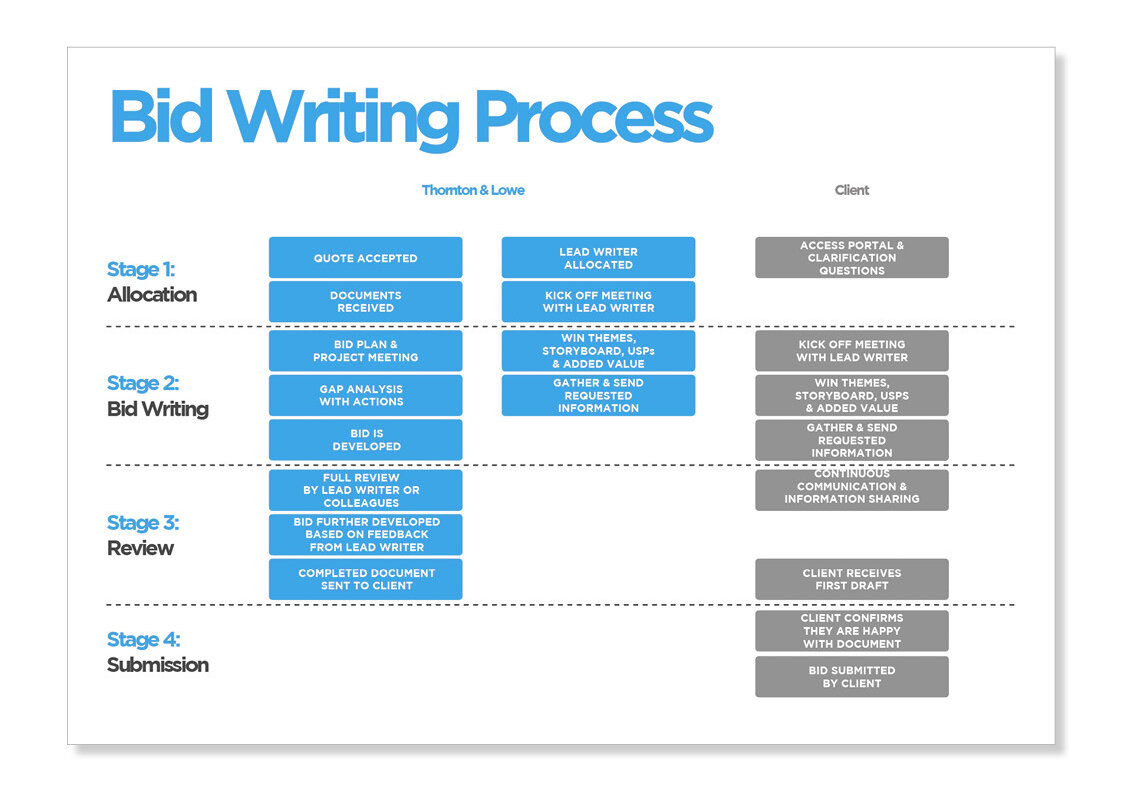Mini Competitions: A Supplier's Guide
A mini competition is part of a call-off under a framework agreement. In simple terms, a mini competition is when a buyer (customer) gets quotes from a pre-approved list of suppliers. With government tenders this follows a more formal route and means:
- You bid to become an approved supplier with a public sector buyer or group of public sector buyers. This involves you responding to their tender process and winning a place on a multi-supplier framework agreement. Frameworks are the most popular route for working with suppliers. It is important to monitor them and ensure you submit a good quality submission. Framework agreements do not however, offer a commitment in terms of any volume of sales. A framework is simply a list pre-approved suppliers.
- Once on this framework, however, when a public sector buyer or contracting authority requires your services, you will be invited to submit a more specific and tailored bid for them. By being on the framework you get a ticket to the party! You will be competing only with approved suppliers on that framework, and on the specific lot, or category of works, which you were successful with. This 'call-off from the framework', a public sector buyer getting quotes from an approved list is your mini competition.
Winning a place on a framework doesn't guarantee work. You still need to win mini competitions. But it gives you a foot in the door with public sector clients.
The Mini Competition Process
- Invitation to Quote (ITQ) or ITT: Buyers issue an opportunity outlining their specific needs.
- Response: Approved suppliers submit bids.
- Evaluation: Bids are reviewed, usually on MEAT (Most Economically Advantageous Tender) or MAT (Most Advantageous Tender) criteria.
- Award: The contract is awarded, and all bidders are notified.
Mini competitions are where the majority of opportunities within a framework arise, and competition is encouraged to ensure value for money. Always be ready to respond quickly and efficiently.
Why It Matters
Bidding for a framework gets you pre-approved, but the real work starts once you are successfully awarded. This is then a chance to use the framework as a sales tool and build relationships. When a buyer issues a mini competition, it’s your chance to tailor a bid to their specific needs. Think of the mini competition as a streamlined tender, where you show how you’ll now meet their exact requirements.
Types of Call-Offs
- Direct Award: Awarded without further competition.
- Mini Competition: All eligible suppliers are invited to bid.
- Sequential Awards: The top-ranked supplier gets first dibs, with others potentially competing if they decline.

Framework Quality Questions vs Mini Competition Quality Questions
The specific quality questions asked during the initial framework competition and subsequent mini competitions can vary. The initial framework questions tend to be more general, while the mini competition questions are often more targeted to the specific requirements of the call-off contract.
Here's a table with examples of potential differences between initial framework quality questions and mini competition questions:
| Initial Framework Quality Questions | Mini Competition Questions |
|---|---|
| Describe your company's experience in delivering services relating to the lot you are bidding for. | Describe your experience delivering services specifically into the healthcare sector. |
| Outline your company's quality assurance processes. | How will you ensure quality control for this specific project, considering the unique requirements and demographics? |
| Explain your company's approach to environmental sustainability. | Considering the environmental impact of delivering this contract, what specific measures will you implement to monitor, minimise and report on your carbon reduction initiatives? |
| Describe your company's staff training and development programs. | How will you ensure that the staff assigned to this project have the necessary skills and experience? |
As you can see, the mini competition questions are more focused on the specific requirements of the call-off contract, while the initial framework questions are more general in nature.

Benefits of a Mini Competition For Suppliers
Being approved on a framework agreement not only gives your business credibility, which in turn can help you win more work, but you also get:
- Access to more public sector contract opportunities.
- Reduced bidding costs as it is not a full tender process.
- A chance to learn more quickly, improve your bid quality and refine your tender pricing.
Mini competitions are shorter than full tender processes, as you already pre-approved/ on the framework.
Advantages for Small and Medium Enterprises (SMEs)
Mini competitions offer several benefits for SMEs in the public sector. You can gain valuable experience and build your reputation by participating in these often 'smaller-scale tenders'.
These competitions often have simpler processes than full-scale tenders. This makes it easier for you to submit bids and compete for contracts.
Key advantages for SMEs:
- Easier entry into public sector work.
- Lower costs to prepare and submit bids.
- Opportunities to build relationships with public sector buyers.
- Chance to prove capabilities on smaller projects.
- Potential stepping stone to larger contracts.
By winning mini competitions, you can establish a track record of successful public sector work. This can help you qualify for bigger tenders in the future.
These competitions often focus on local or regional needs. This stems from the structure of the framework agreement and their 'lot' structure. As an SME, you may be well-positioned to meet these specific and local requirements. With social value being increasingly important in tenders this can play to the strengths of SME bidders.
Mini competitions can provide a steady stream of work for your business.
Faster Contract Awards
Mini competitions move much quicker than open tenders. The process often takes weeks instead of months. This benefits you in several ways:
- Shorter bid preparation time.
- Quicker decisions from buyers.
- Faster access to new work!
You'll also know sooner if you've won or lost, which can help you quickly learn from mistakes and improve your approach to bid management.

Feedback and Continuous Improvement
Getting feedback is key for suppliers in mini competitions. You can learn a lot from both wins and losses. Ask the buyer for comments on your bid. Find out what worked well and what didn't.
- Use this info to make your next bids better. Look at where you scored low points. Think about how to improve those areas. Maybe you need clearer writing or stronger evidence.
- Keep track of all feedback in one place. Look for patterns over time. This can show you where to focus your efforts.
- Don't just wait for feedback. Ask your team what they think went well or badly. Be open to new ideas and ways of working. These lessons learned exercises can make all the difference. We are often engaged on these as the bid management subject matter experts.
By always trying to get better, you'll improve your chances of winning. Each bid is a chance to learn and grow your skills.
Challenges and Solutions for Suppliers
Participating in mini competitions can be tricky for public sector suppliers. You might face tight deadlines and complex requirements. These can make it hard to submit strong bids on time.
To tackle this, get organised early. Set up a system to track open competitions and deadlines. This will help you avoid last-minute rushes.
Limited resources can also be a hurdle, especially for smaller businesses. You may struggle to dedicate enough staff to bid writing.
Consider partnering with other firms to pool resources. This can help you create more competitive bids without overextending yourself.
Understanding buyer needs can be challenging too. Public sector requirements are often very specific. To address this:
- Read tender documents carefully.
- Ask questions during clarification period.
- Research the buyer's past purchases and your competitors tender wins.
Pricing can be tricky in competitive environments. You want to win the contract but also make a profit. Sometimes, you will lose bids despite your best efforts. Don't get discouraged. Ask for feedback and use it to improve future business proposals or tendering efforts. In public sector tenders and mini competitions you can often use the tender feedback to calculate your competitors' pricing.
Remember, each mini competition is a chance to learn and refine your approach. With practice, you'll become more efficient and effective at bidding.
Looking for a quote for bid writing services?
Contact usOutsourced Bid Writing Services for Mini Competitions
At the heart of Thornton & Lowe is our bid writing services. We are outsourced bid management consultants who can not only monitor tenders opportunities for you, we can also:
- Provide a full bid administration service including tender portal management and monitoring mini competition opportunities.
- Outsourced bid writing and bid management to ensure you can respond quickly and efficiently. Helping you respond to tenders and mini competitions more easily and without it draining your in-house capacity.
- Bid training and mentoring services.
- Bid recruitment services, sourcing permanent members for your bid team, such as Bid Writers and Bid Managers, as well as freelance bid staff.
Mini Competition Bidding Tips
- Ensure you are bidding for the right framework. This includes assess the 'call-off' procedure and ensuring it is a good fit for your business.
- Even though the framework terms are fixed, refine your bid to meet the buyer’s exact needs.
- Not all frameworks are alike, some for example allow direct awards, while others always use mini competitions. Knowing how a framework operates helps you plan your bid strategy better.

Need bid or tender support?
Contact us todayFrequently Asked Questions
Mini competitions offer many benefits for public sector suppliers. They can improve value, create opportunities, and level the playing field.
What advantages do public sector suppliers gain from participating in mini competitions?
You can win new business without going through a full tender process. Mini competitions give you chances to showcase your strengths. You can tailor your bid to the exact requirements. This helps you stand out from other framework suppliers. It is also largely a closed market, so only those approved onto the framework are sent the mini competitions, which can often reduce the competition.
Can mini competitions mitigate the incumbent advantage in public procurement?
Relationships are still important even when bidding for public sector contracts. However, being on a framework agreement provides with you the chance to engage and be seen as trusted. Mini competitions from the framework can then help level the playing field. And of course public sector buyers are under increased levels of transparency and scrutiny, which further helps in ensuring a fair tender evaluation.
What is the purpose of a standstill period in the context of mini competitions?
The standstill period gives unsuccessful bidders time to challenge the decision. It usually lasts 10 days. During this time, you can ask for feedback on your bid. You can also raise any concerns about the process before the contract is signed. For low value contracts they may not follow this same rule with regards to the number of the days.
How do mini competitions differ from full tender processes in public procurement?
Mini competitions are quicker and simpler because you are already approved as a supplier. You don't need to prove your qualifications again. The buyer has already vetted suppliers on the framework. Mini competitions focus on project-specific details and pricing. They often have shorter timelines and less paperwork.
What strategies can suppliers use to succeed in mini competitions within the public sector?
Read the brief carefully and address all requirements. A common mistake is to take the same approach as responding to a framework, which is often a lot more generic. A mini competition needs to all about the specific buyer and their needs. Show how you'll deliver added value and prior to a live mini competition ensuring you build good relationships with framework managers.




